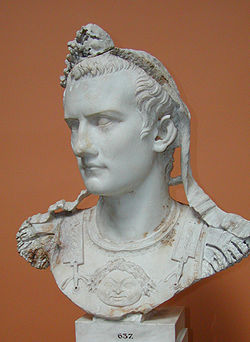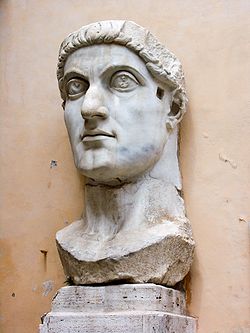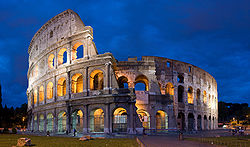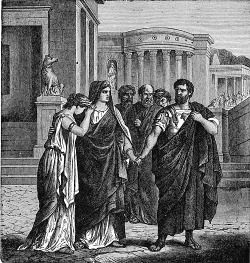Timendi causa est nescire.
Ignorance is the cause of fear. - Seneca
(Bissette, 2009, para. 25)
Expansion
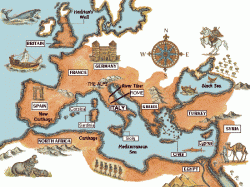
Map of the Roman Empire
How did Rome become a large empire? There are five basic stages.
Stage 1. 400BC
Rome takes over the Italian peninsula
First, Rome took over the Etruscans to the North. The Etruscans didn't put up much of a fight, so the land was taken over easily. Then, Rome headed for the Greeks in the South who put up a good fight. The Greek army initially sent an army to fight off Rome. Eventually, the Greeks ran out of warriors, and probably got sick of sending more over, so they gave up. Rome had a continuous flow of warriors, because they were land-owners. They didn't need to travel over the sea as the Greeks, so they had the advantage.
Stage 2. 264-220BC
First and Second Punic Wars
See the Punic War article for more information!!
In the first Punic war, Rome gained Sicily, Sardinia, and Corsica.
In the Second Punic War, They gain the bottom portion of Spain.
Stage 3. 146BC
3rd Punic War & other conquests
After the third Punic war, Rome gained Carthage's land. This was the land around to C-indent in Africa and the rest of Spain. Some land was gained in modern-day Turkey--most of the peninsula that sticks out and a couple of other parts in Asia. Nobody in Asia put up a fight, so it was a pretty easy conquest. They didn't fight, because Rome was a "nice" conquer. They would let the Asians keep their way of life; Asians were more like allies. Rome would protect the Asian areas, but they may need to give soldiers to help Rome.
Stage 4. 40BC
Julius Caesar conquered Gaul (France) and parts of Northern Europe. This is what made him well-loved! Also, this is the time when Augustus took over. The Roman Empire gained Egypt's land upon the death of Cleopatra. This is also the time when Rome entered the Pax Romana. This happened, because to the west there was sea--it couldn't be conquered and the land that is now Russia was useless. It would've been a waste to conquer it. In Asia, the Parthians were strong, so it really wasn't worth the risk to go to war for land with them.
Stage 5. 130AD the end of the Pax Romana
Rome gained the Southern half of England. The actually built a wall there to keep out Celtic barbarians (Hadrian's wall, built by none other than emperor Hadrian!). Additionally, Rome gained some more of Africa. They were able to defeat some of the Parthian Empire and gained some more land on Turkey and extending to the East. They also gained some land to the south of Turkey, heading towards Africa. At this time, the Roman Empire was huge. Diocletian decided to split the Empire, and Constantine moved the capital to Constantinople (creative, right?) in Turkey. This left the western half, most of Europe and part of Africa open to barbarians, and barbarians had been waiting for this chance for a long time! They were ready!
Here is a video about Roman expansion. It goes past the Roman empire, but the first half is good in illustrating the above points:
http://www.youtube.com/watch?v=dwpp60nRVAw
Links:
http://www.ucalgary.ca/applied_history/tutor/firsteuro/roman.html
http://www.worldhistory.timemaps.com/ancient-rome/expansion_in_italy.htm
Emperors
There were good, and there were bad. The bad had a special name--Julian-Claudians. We know Augustus was a good ruler, but, unfortunately for him, his descendents were bad. They were the Julian Claudians!
JULIAN-CLAUDIANS
Tiberius: He wasn't exactly a bad leader, but he was crazy! He was paranoid about being assonated. Thus, he got rid of the problem by exiling himself to a Roman island. Yikes! People sure got annoyed with this! Besides this, he killed a lot of his OWN family :( People believe he aided in the murder of his nephew Caligula. To top it off, he practiced incest. Way to create more crazys, Tiberius! The good news: He never got assonated but rather died of old age. His "good" legacy, if you could say such a thing, was he strengthened the frontiers of the empire and saved money.
Caligula:
He was Tiberius' murdered nephew. He was kind of like Tiberius, practicing incest and all, but when he couldn't get his fix there, he went to brothels (lets just say prostitution). Oh yeah, we wouldn't want to forget that he had many, many wives. Obviously, he had real mental problems--he would need medical attention if he lived now! To top it off, he spent a lot of money and taxed a lot. So, if you were poor, well you were even poorer.
Nero:
He was, as people say, possessed. He murder tons of people, not to mention his mother (who got him a job in the first place) and ex-wives. He absolutely hated Christians and prosecuted them every chance he got. Once, the city of Rome caught on fire. It was pretty bad. Well, Nero said it was the Christians! I wonder what thought process he had! Besides Christians and family, he hated dogs, yes the animal, and killed them too! To the relief of many I bet, he committed suicide. Did I forget to mention he was a good administrator?
Good emperors :) Rome, thankfully, came under rule of good rulers!!
Nerva (96-98--we're in AD now!)
He was the genius who began choosing an heir to the "throne." Previously, no ruler was really set to take over after the death of another. Therefore, many civil wars broke out to decide who would lead the glorious empire. Anyway, Nerva also signed an oath saying he would not execute senators. I'm sure this came as a relief to the senators, and, who knows, it may have strengthened the government for senators did not need to fear (as much) expressing their opinions. Additionally, he released any prisoners or exiles that were innocent. Previous emperors may have punished those people, because they appeared as threats or simply did not care for them. Arguably one of the greatest decisions he made was to make a loan system. People could get loans with 5 percent interest. This helped poor people who needed a boost. It was kind of like the United States' welfare program. Lastly, he proclaimed that he would not use gold or silver to build statues. This probably served as a symbol that meant he would not waste resources or spoil himself too much. Nerva presented a good omen for the Roman Empire!!
Trajan: (98-117)
Hadrian: (117-138): He was in charge when the Pantheon was finished. He was the man who did some more conquering, including England. He built Harridan’s wall to keep the barbarians out!! Additionally, he reorganized the bureaucracy of Rome. A bureaucracy is a system of government that consists of different levels.
Antonius Pius: (138-161)
Marcus Aurelius: (161-180)
Diocletian: (245-313)
This ambitious man doubled the size of the Roman army! He must have wanted lots of protection as he did hardly any conquering! Well, he claimed decent from the gods, Roman gods that is. Therefore, he persecuted Christians. After all, if his gods were fake, as Christians believed, he was phony too! Then, no gods would have given him special power to rule, and people would probably question him and his judgments. The thing he should be most remembered for is dividing the Roman Empire. After all, it was huge and pretty hard to rule! He made Constantine the emperor of the east.
Constantine: (285-337)
First of all, Constantine decided to reunite Rome. But, when he did so, he moved the capitol to Constantinople, modern day Istanbul, Turkey. Sure, this was nice for him and all of west Rome, but the east ultimately suffered. Their culture, riches, and intellectuals all moved to Constantinople! Well, the complete story is for another page! Additionally, Constantine announced everyone had freedom of religion. He became the first Christian emperor. It is said that he had a vision before a battle that he interpreted as fight in the name of the cross. He obeyed this vision and won the battle! Others say that he had a vision or awakening on his death bed to the wonders of Christianity. Either way, this was major for Christians and significantly impacted its ability to spread. Some would follow Constantine and convert, others would stop hiding and profess their beliefs, and yet others would convert upon hearing those professions!! Most likely, he made Christianity the hit it is today. Christians may say, "Thank God for Constantine!"
List of Roman emperors
A link for further information about emperors http://www.roman-emperors.com/
Here is a video of Roman emperors. It has more than I've discussed, and it does not offer information. It's a very nice visual, though! http://www.youtube.com/watch?v=Wkh0__I0ht4
JULIAN-CLAUDIANS
Tiberius: He wasn't exactly a bad leader, but he was crazy! He was paranoid about being assonated. Thus, he got rid of the problem by exiling himself to a Roman island. Yikes! People sure got annoyed with this! Besides this, he killed a lot of his OWN family :( People believe he aided in the murder of his nephew Caligula. To top it off, he practiced incest. Way to create more crazys, Tiberius! The good news: He never got assonated but rather died of old age. His "good" legacy, if you could say such a thing, was he strengthened the frontiers of the empire and saved money.
Caligula:
He was Tiberius' murdered nephew. He was kind of like Tiberius, practicing incest and all, but when he couldn't get his fix there, he went to brothels (lets just say prostitution). Oh yeah, we wouldn't want to forget that he had many, many wives. Obviously, he had real mental problems--he would need medical attention if he lived now! To top it off, he spent a lot of money and taxed a lot. So, if you were poor, well you were even poorer.
Nero:
He was, as people say, possessed. He murder tons of people, not to mention his mother (who got him a job in the first place) and ex-wives. He absolutely hated Christians and prosecuted them every chance he got. Once, the city of Rome caught on fire. It was pretty bad. Well, Nero said it was the Christians! I wonder what thought process he had! Besides Christians and family, he hated dogs, yes the animal, and killed them too! To the relief of many I bet, he committed suicide. Did I forget to mention he was a good administrator?
Good emperors :) Rome, thankfully, came under rule of good rulers!!
Nerva (96-98--we're in AD now!)
He was the genius who began choosing an heir to the "throne." Previously, no ruler was really set to take over after the death of another. Therefore, many civil wars broke out to decide who would lead the glorious empire. Anyway, Nerva also signed an oath saying he would not execute senators. I'm sure this came as a relief to the senators, and, who knows, it may have strengthened the government for senators did not need to fear (as much) expressing their opinions. Additionally, he released any prisoners or exiles that were innocent. Previous emperors may have punished those people, because they appeared as threats or simply did not care for them. Arguably one of the greatest decisions he made was to make a loan system. People could get loans with 5 percent interest. This helped poor people who needed a boost. It was kind of like the United States' welfare program. Lastly, he proclaimed that he would not use gold or silver to build statues. This probably served as a symbol that meant he would not waste resources or spoil himself too much. Nerva presented a good omen for the Roman Empire!!
Trajan: (98-117)
Hadrian: (117-138): He was in charge when the Pantheon was finished. He was the man who did some more conquering, including England. He built Harridan’s wall to keep the barbarians out!! Additionally, he reorganized the bureaucracy of Rome. A bureaucracy is a system of government that consists of different levels.
Antonius Pius: (138-161)
Marcus Aurelius: (161-180)
Diocletian: (245-313)
This ambitious man doubled the size of the Roman army! He must have wanted lots of protection as he did hardly any conquering! Well, he claimed decent from the gods, Roman gods that is. Therefore, he persecuted Christians. After all, if his gods were fake, as Christians believed, he was phony too! Then, no gods would have given him special power to rule, and people would probably question him and his judgments. The thing he should be most remembered for is dividing the Roman Empire. After all, it was huge and pretty hard to rule! He made Constantine the emperor of the east.
Constantine: (285-337)
First of all, Constantine decided to reunite Rome. But, when he did so, he moved the capitol to Constantinople, modern day Istanbul, Turkey. Sure, this was nice for him and all of west Rome, but the east ultimately suffered. Their culture, riches, and intellectuals all moved to Constantinople! Well, the complete story is for another page! Additionally, Constantine announced everyone had freedom of religion. He became the first Christian emperor. It is said that he had a vision before a battle that he interpreted as fight in the name of the cross. He obeyed this vision and won the battle! Others say that he had a vision or awakening on his death bed to the wonders of Christianity. Either way, this was major for Christians and significantly impacted its ability to spread. Some would follow Constantine and convert, others would stop hiding and profess their beliefs, and yet others would convert upon hearing those professions!! Most likely, he made Christianity the hit it is today. Christians may say, "Thank God for Constantine!"
List of Roman emperors
A link for further information about emperors http://www.roman-emperors.com/
Here is a video of Roman emperors. It has more than I've discussed, and it does not offer information. It's a very nice visual, though! http://www.youtube.com/watch?v=Wkh0__I0ht4
Life in the Roman Empire--ENTERTAINMENT
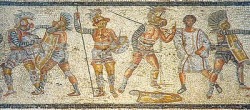
Other aspects of Roman life:
Clothing
Society: Many aspects of life!
Video clips from the Gladiator movie--shows, to an extent, what a gladiator may face. http://www.youtube.com/watch?v=OUJaGlFJBjY
Clothing
Society: Many aspects of life!
Video clips from the Gladiator movie--shows, to an extent, what a gladiator may face. http://www.youtube.com/watch?v=OUJaGlFJBjY
Review
What were the steps in Roman expansion?
Why did the Pax Romana occur?
Who were the Julian-Claudians?
Can you explain who Caligula, Tiberius, Nero, Nerva, Hadrian, and Diocletian were? What did they do for the Roman Empire?
How did the rich Romans like to live?
Why did the Roman government hold games?
Who were gladiators?
Why would a "free" man become a gladiator?
Did emperors ever fight in the Colosseum?
Did Roman citizens like the events held in the Colosseum?
Why did the Pax Romana occur?
Who were the Julian-Claudians?
Can you explain who Caligula, Tiberius, Nero, Nerva, Hadrian, and Diocletian were? What did they do for the Roman Empire?
How did the rich Romans like to live?
Why did the Roman government hold games?
Who were gladiators?
Why would a "free" man become a gladiator?
Did emperors ever fight in the Colosseum?
Did Roman citizens like the events held in the Colosseum?
